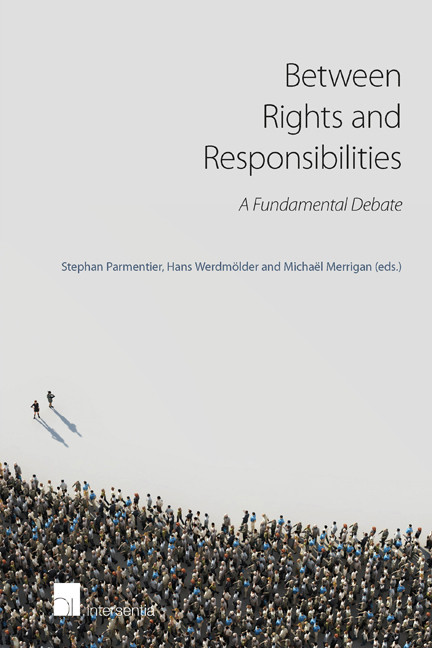Book contents
- Frontmatter
- Foreword
- Contents
- About the Authors
- Introduction: Towards an Integrated Vision of Rights and Responsibilities
- PART I FUNDAMENTAL RIGHTS AND FUNDAMENTAL RESPONSIBILITIES: SETTING THE SCENE
- Human Rights and Human Responsibilities. Setting the Ethical and the Conceptual Scene
- Rights, Responsibilities and Duties for the Civil Society. Moral Challenges Put Forward by the Millennium Development Goals
- Steering Clear of the Twin Shoals of a Rights-Based Morality and a Duty‑Based Legality
- Human Duties and Responsibilities for the Reinforcement of Human Rights. The Declaration of Human Duties and Responsibilities (1998)
- PART II RIGHTS AND RESPONSIBILITIES IN SPECIFIC CONTEXTS
- Declaration of Human Duties and Responsibilities
Human Rights and Human Responsibilities. Setting the Ethical and the Conceptual Scene
from PART I - FUNDAMENTAL RIGHTS AND FUNDAMENTAL RESPONSIBILITIES: SETTING THE SCENE
Published online by Cambridge University Press: 22 November 2017
- Frontmatter
- Foreword
- Contents
- About the Authors
- Introduction: Towards an Integrated Vision of Rights and Responsibilities
- PART I FUNDAMENTAL RIGHTS AND FUNDAMENTAL RESPONSIBILITIES: SETTING THE SCENE
- Human Rights and Human Responsibilities. Setting the Ethical and the Conceptual Scene
- Rights, Responsibilities and Duties for the Civil Society. Moral Challenges Put Forward by the Millennium Development Goals
- Steering Clear of the Twin Shoals of a Rights-Based Morality and a Duty‑Based Legality
- Human Duties and Responsibilities for the Reinforcement of Human Rights. The Declaration of Human Duties and Responsibilities (1998)
- PART II RIGHTS AND RESPONSIBILITIES IN SPECIFIC CONTEXTS
- Declaration of Human Duties and Responsibilities
Summary
INTRODUCTION
We live in ‘a time of responsibility’, as the French philosopher Jean Greisch once remarked. We are called upon, all the more insistently, to take a stand and to act on that choice in the often complex and confusing circumstances of insecurity, uncertainty, and vulnerability to which our late-modern societies have become subject. These societies find themselves in fact on the seemingly perilous knifeedge of local contexts, on the one hand, and a globalising perspective, on the other. This leaves people uncertain how to give form to their own personal autonomy, and in particular, how to develop their own future.
As a moral basis to law, autonomy actually refers not so much to the choices we make on a daily basis, perfunctorily and without too much reflection, but rather to the specific capacity of an individual person to make deeply reflective choices. Gerald Dworkin, following Harry Frankfurt, calls this latter conception of autonomy ‘a second-order capacity of persons to reflect upon their first-order preferences [that first, more superficial notion of autonomy], desires, wishes, and so forth and the capacity to accept or attempt to change these in light of higher-order preferences and values.’ He continues: ‘By exercising such a capacity, persons define their nature, give meaning and coherence to their lives, and take responsibility for the kind of person they are.’
It is precisely this notion of responsibility, anchored in a strong sense of autonomy and in a robust capacity for reflection, that can give conceptual texture to a number of legislative instruments proposed in the last decennia and designed to re-establish the equilibrium between individual rights and freedoms, and individual duties, obligations, and responsibilities. I deal with just three of these initiatives, since each of them illuminates a specific dimension of the relation between rights and responsibilities.
SETTING THE ETHICAL SCENE
THREE PROPOSALS FOR CHARTERS OF HUMAN RESPONSIBILITIES
In the wake of the 50th anniversary of the Universal Declaration of Human Rights, a number of leading former statesmen and politicians gathered under the auspices of the ‘InterAction Council’ (created in 1983) and proposed a Universal Declaration of Human Responsibilities. In the ‘Introductory Comment’ to their proposal, the authors explain why the time has come to talk about human responsibilities.
- Type
- Chapter
- Information
- Between Rights and ResponsibilitiesA Fundamental Debate, pp. 13 - 34Publisher: IntersentiaPrint publication year: 2016

